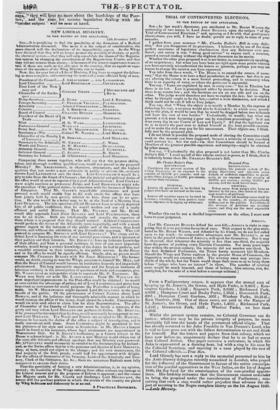TRIAL OF CONTROVERTED ELECTIONS.
TO THE EDITOR OF THE SPECTATOR.
SIR—In last week's Spectator, you attributed to Mr. RIGBY WASON the authorship of two letters to Lord JOHN RUSSELL upon the subject " of the Trial of Controverted Elections ;" and, agreeing. as I do with that gentleman's observations, you will, I have no doubt, permit me to reply to some of your remarks.
I gather from your sentence " Mr. Charles Buller's Bill is very defec- tive, that you disapprove of its provisions. I believe it to be one of the most perfect specimens of legislative charlatanism that any Reformer ever pro. duced ; and surely it was " doing good service" to expose such a measure, passed a second reading without the slightest discussion on its merits.
Whether the other plan proposed is or is not better, is, comparatively speaking, of no importance ; but when you have been set right upon some points wherein you have certainly misunderstood the letters in question, perhaps you may see reason to change the opinion you have expressed.
You infer from these words, " The House is to amend the return, if neres. vary," that the House is to have a final jurisdiction in all cases: but tide is not so; altering the return is a mere formal proceeding, and is necessary when there is an equality of votes, or where the petitioner is successful. You say, " Laws are explained by men in every cam: " but in Election law there is no law. Law is promulgated either by statute or by decision. Now there is no statute law ; and the decisions are six on one side and six on the other. The judge would therefore not have to explain the law, but to explain what he thought ought to be the law,—rather a wide distinction, and which 1 think could not be sate if left to Tory judges. You say, that " When the object Is to terrify a Member by the expense of defending his seat, a scrutiny would also be demanded ; in which case, accord. ing to the plan, it would be seen that he would be dragged before two tribunals and have the cost of two battles." Undoubtedly lie would ; but what can prevent a rich man harassing a poor one by vexatious proceedings? Is it not done every day in our Courts of Law and Equity? All that the legislator can do is to enable the poor man to defend himself at the least possible expense and to make the rich man pay for his amusement. Their objects are, I think fully met by the proposed plan. 1 do not think it possible the proposed mode of electing the Committee could work in the manner you have suggested, because a minority of only one-third could prevent it ; but the end—via. that Committees should be funned of Members of the greatest possible experience and integrity—might be obtained by other means. You say, " Undoubtedly the plan proposed is nut better than Mr. Charles Buller's Bill." I avail myself of this tabular method to move, AS I think, that it is infinitely better than Mr. CHARLES BuLLER's
Proposed Plan. RZOISTRATION.
Abolishes the present system of Re. vising Barristers, and appoints seven Judges of sufficient experience to go car. euits. at an expense to the cuoutry of 16,0001. per annum; saviug 21.0001. per entrain, and the work better done.
TRIBUNAL.
Takes away from judges who have an interest in the case, two thirds of the ave- rage lumber of petitions. Provides that all scrutiny cases shall be tried in the country, at comparatively wining cost to the parties. Tx rethirds of the average of petitions aro scrutiny cases; and they are the most expensive class.
Whether this one be not a decided improvement on the other, I must now leave to your judgment.
Mr. Charley Buller's Plan.
lieCeISTRATIO:4.
Continues the present system of Be. vising Batristers, at an expense to the country of 30,0001. per annum; and sp. points three Judges, at 6,t1001. per annum, to revise their decisions.
TRIBUNAL.
Leaves all questions to be decided by judges also have an interest in the case.
Leaves all scrutiny cases to be tried in London ; entailing on both parties enor• mous expenses is bringing up witnesses.
[Let Mr. CHARLES BULLER defend his own hill—Amtcus is right in sup- posing that it is no particular favourite of ours. With respect to the plan attri- buted to Mr. limn, WASON, and defended by his friend, we do not feel called upon to say much: its comparative advantages over Mr. BULLER'S, as set furth in the parallel columns of A etic us, will speak for themselves. But it may Ire observed, that whenever the minority is less than one-third, the majority have the power of packing every Election Committee. For many years toge- ther within the prevent century, the minority did not number one-third. In the first Reformed Parliament, the Tories barely mustered 150 Members. Should the Whips and Tories coalesce in the present House of Commons, the Opposition would not amount to 200. The scrutiny cases may average two. thirds of the whole, but the Tories would shape their cases so as to bring them before "judges who have an interest" in them. The number of scrutiny cases would be much lessened, and those of bribery, false returns, riot, fm. multiplied, for the sake of a trial before a corrupt tribunal.]


























 Previous page
Previous page